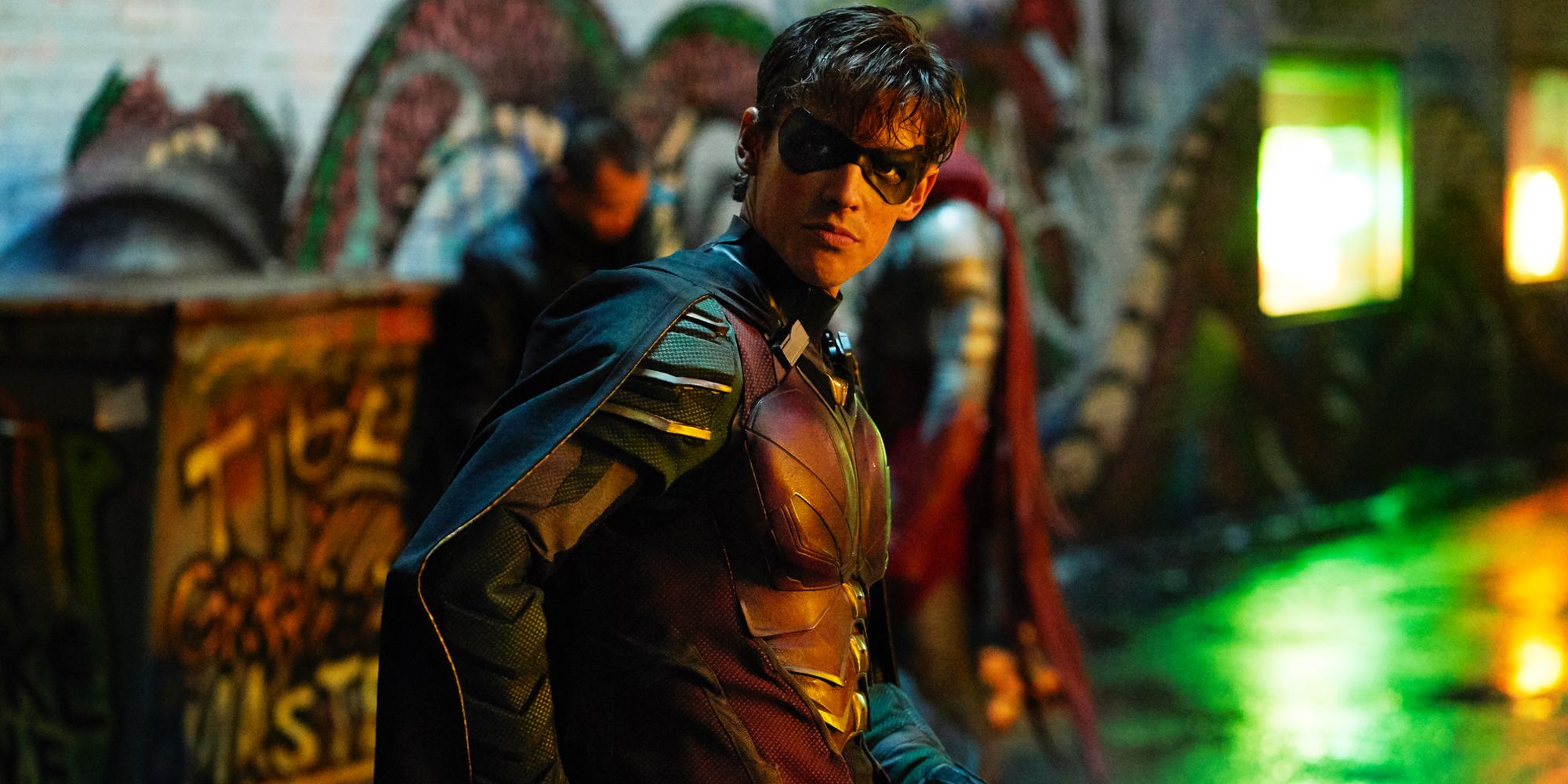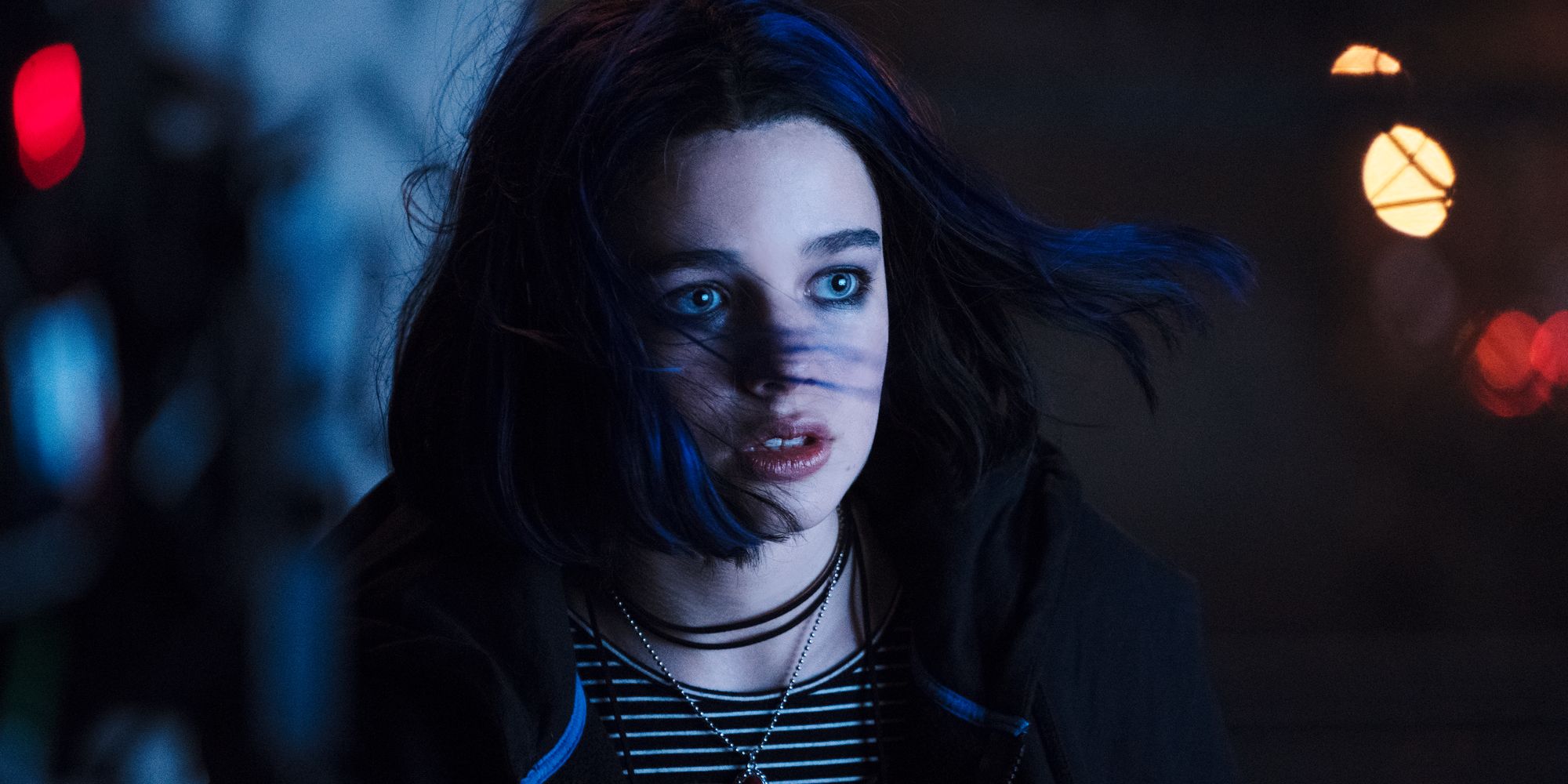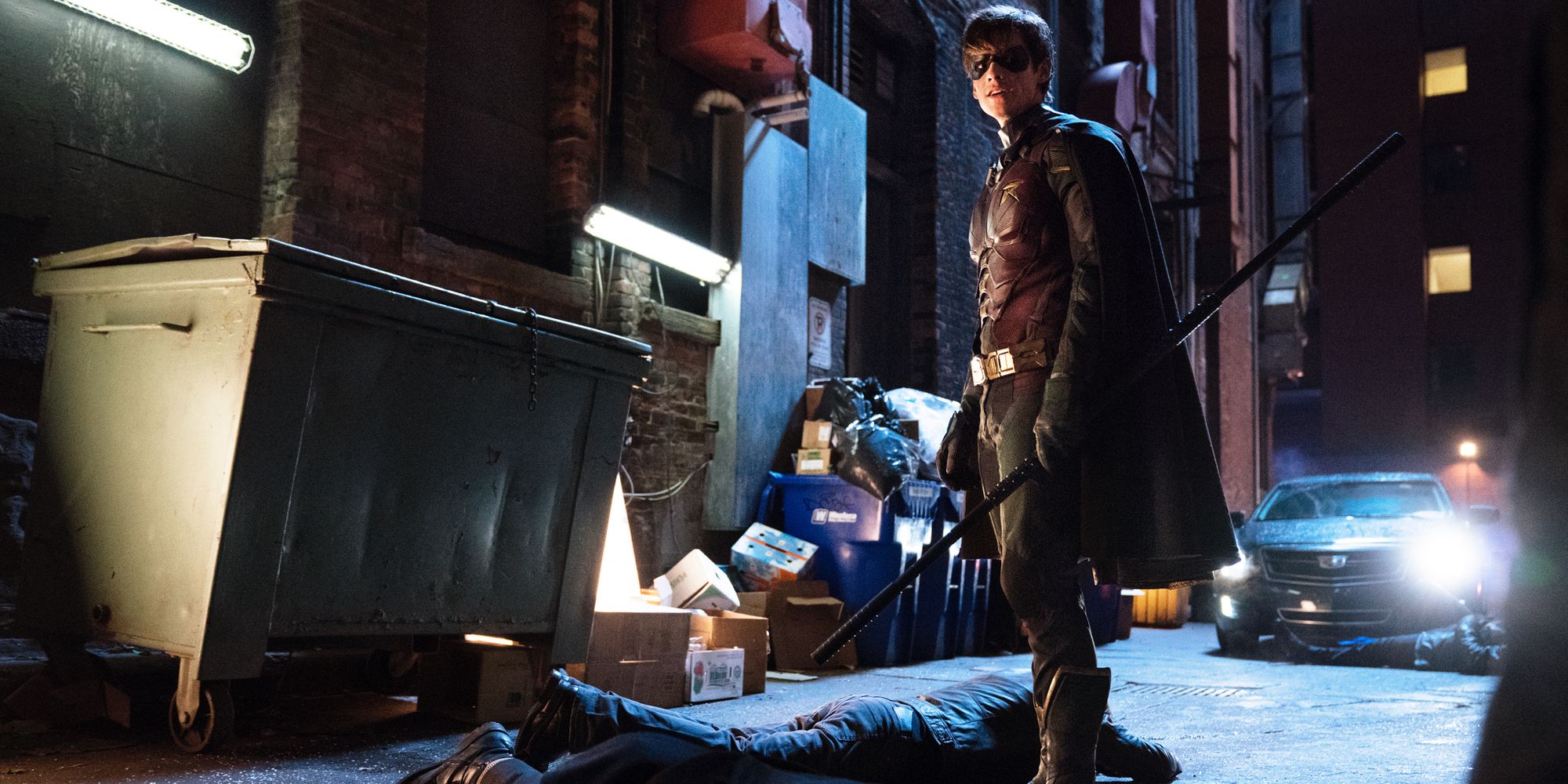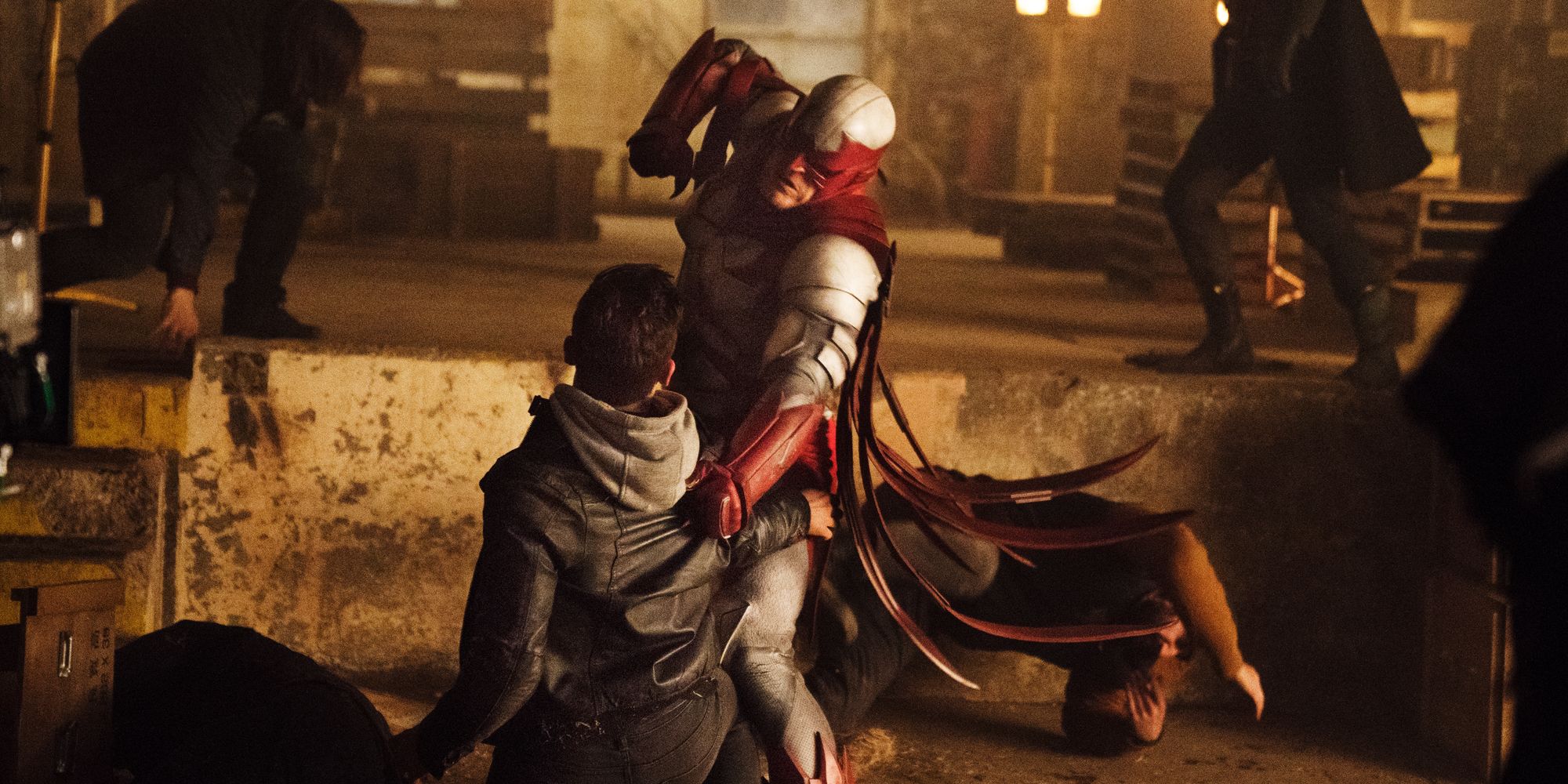The first takeaway from Titans, the flagship series from the new DC Universe streaming service, is a familiar one: dark, gritty, and violent may add up to mature content, but they don’t necessarily add up to mature storytelling. The new series, which features familiar comic book and cartoon heroes Robin (Brenton Thwaites), Raven (Teagan Croft), Dove (Minka Kelly), Beast Boy (Ryan Potter), Starfire (Anna Diop), and Hawk (Alan Ritchson), is almost pathologically committed to reminding viewers what a somber and uncompromising take on the one-time teen heroes the show really is. This should come as no surprise to anyone who watched the first trailer, in which the gloomy and violent Boy Wonder somewhat famously uttered “F*** Batman,” to no one in particular.
Of course that line wasn’t meant for anyone in the scene with Thwaites; it was meant for everyone watching. More to the point, it was meant for everyone who wasn’t yet watching but might be on the fence about adding yet another streaming service subscription to their ever-dwindling wad of discretionary income. It was such a baldly self-aware declaration of this series’ — and by extension, newly launched streaming service’s — intention to attract viewers, the only thing surprising about it is that the trailer only went as far as it did.
More: The Good Place Season 3 Review: Still One Of The Most Inventive Comedies On TV
But, believe it or not, DC knows what it’s doing. It knows there’s an audience for this kind of stuff, and the company is betting big that fans who were willing to spend money on a ticket to listen as a foulmouthed mutant cracked meta-jokes to rule the box office will intersect nicely with those who absolutely want more dark, gritty, Martha-lovin’ interpretations of familiar DC heroes, as rendered by Zack Snyder and, to a lesser extent, David Ayer. As such, it’s no surprise to discover that in offering the umpteenth superhero television series competing for viewers’ eyeballs (and, more directly, their money), Titans is equal parts fascinating and frustrating.
The series is fascinating in that the creative team behind it doesn’t appear to have learned any lesson whatsoever from the critical response to films like Batman V Superman, Suicide Squad, or Justice League — a movie that so thoroughly captured the raw power of a disinterested shrug that people are actually petitioning for a Snyder cut. Instead, in bringing the Teen Titans to life, creators Geoff Johns, Greg Berlanti, and Akiva Goldsman have almost obstinately doubled down on the most heavily criticized aspect of DC’s stunted cinematic universe, serving up gloomy and violent heroes who lob f-bombs and other “mature” dialogue at one another like they do razor-sharp letters of the alphabet. But here they do it more for the sake of those watching than any discernible purpose on behalf of the character or the series’ narrative.
Other than some dull performances and pacing issues early on, this is where fascinating begins to bleed into frustrating. Titans is so determined to stand out on the basis of its TV-MA depiction of superheroes that it quickly becomes almost absurdly self-serious and self-aware. There’s not a moment in the first episode that feels organic, or as if the series is interested in anything other than blandly challenging the notion of who these characters are and what they represent. And, worse yet, Titans isn’t doing this for any reason other than to appeal to those with the interest, time, and income for what is essentially a niche streaming service.
It would be one thing if Titans gave the impression it was headed somewhere groundbreaking with its story that begins with a series of — you guessed it — bloody and violent exchanges that allow Raven to coincidentally meet up with Det. Dick Grayson, but even after three episodes that’s hardly the case. Instead, Titans is more committed to illustrating all the ways its characters aren’t “your dad’s Titans” than it is in saying anything substantive about who they are and what they hope to accomplish.
As was made abundantly clear in the first trailer, Titans’ Robin is an angry young man whose penchant for violence has seemingly distanced him from not only Bruce Wayne and his alter ego (or is a response to that distance), but many of the other heroes in the DCU as well. As takes go, a more violent Robin isn’t exactly daring or inventive, but again, it checks a lot of boxes with regard to the series’ presumed audience. The same is true of Raven, who is key to the central plot, which revolves around those who want to stem the darkness (naturally) inside her that sometimes manifests itself as a mirror image who takes its cues from the Regina George insult playbook.
Like Thwaites, Croft takes a fairly straightforward approach to her character. Raven and Dick are bad-tempered people, damaged by their difficult pasts. Early on Raven’s abilities even allow her to witness the tragedy of the Flying Graysons, which matches her own horrifying experience when the people searching for her attack her mother first. But these tragic, haunting pasts don’t quite give the characters the definition they need in order to be compelling. A mistrusting, mystically powered teen and a brooding, violent psychopath with (adoptive) daddy issues may well become more interesting as the series progresses, but in the early going Titans settles for the same thing as too many other superhero shows: It assumes the audience already knows who these characters are and lets that supposed knowledge fill in the gaps that would make all the difference on screen.
The one bright spot in the early episodes is Alan Ritchson as Hank Hall, who is also the crime fighter known as Hawk. Ritchson somehow more fully embodies what Titans and its creators are trying to do. He curses, abuses pain medication, and hopes to retire to a farm one day with his girlfriend and crime-fighting partner Dawn, or Dove. It doesn’t hurt that Ritchson’s matinee idol good looks make him an ideal fit to play a comic book character, but he does more with his performance than physically embody his character; he also imbues Hank with a personality that changes depending on his situation. When he’s first introduced, Hawk is in a tight situation, one that actually calls for the dropping of all those f-bombs. And Ritchson delivers them with a mix of humor and real human emotion. He’s playing to the needs of the character in the situation, not the desires of the audience who want to hear a C-level DC hero say the F word. Of the members of the cast, it’s Ritchson who gets that these characters can be dark and violent, but they also need to be fun to watch if the series is going to amount to anything.
DC and Warner Bros. clearly see a lot of value in their comic book characters navigating a grim, ultra dark world. More often than not, though, they wind up personifying that atmosphere rather than combating it. And while some viewers will likely find that approach tiresome and more than a little frustrating, there is still going to be an audience for this kind of storytelling. In that sense, Titans and DC’s nascent streaming service are a success, as they’ve considered their ideal viewer/subscriber and created content designed specifically for their unique tastes. The series doesn’t put forward any new or particularly compelling thoughts about its characters or about superheroes in general. It’s satisfied to deliver Robin and co. with a patina of overly conspicuous mature content and to leave it at that. If that’s how DC intends to carve out its little corner of the streaming content space and lure subscribers, then so be it. It will probably work.
Next: Bob’s Burgers Season 9 Premiere Review: A Musical Ode To Teenage Hormones
Titans will stream on DC Universe starting Friday, October 12, 2018.




